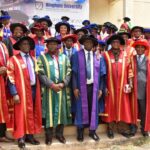By Henry Oladele
A Professor of Comparative Study of Religions and Gender Studies, Adepeju Johnson-Bashua, on Tuesday said lack of access to economic resources contributed much to poverty among women in Africa.
Johnson-Bashua made the assertion while delivering the 105th Inaugural Lecture of Lagos State University (LASU) at the Ojo campus of the university.
The News Agency of Nigeria (NAN) reports that Johnson-Bashua teaches at the Department of Religious and Peace Studies Facaulty of Arts, LASU.
The 105th inaugural lecture was entitled ‘Historicising, Contextualising and Justifying Women’s Aluta Continua in United Religious Spaces’.
The professor said: “Women’s poverty in African countries is directly related to the absence of economic opportunities and autonomy, and lack of access to economic resources including credit, land ownership and inheritance.
“Others are lack of access to education and support services and their minimal participation in decision-making process.”
She added that men enjoyed better economy, making poverty the root of gender discrimination in the society.
“Men still enjoy a larger share of the economy; thus, poverty stands at the root of gender discrimination in our patriarchal society, and the economic dependence on the male counterpart is itself a cause of gender disparity.
“Eradicating poverty should be a priority for all sectors of society, with the main concerns focused on womnen.
“The government should implement programmes that are inclusive and transparent,” she said.
The inaugural lecturer said the title explored the challenges and resistance faced by women in patriarchal religious settings.
“It traces the historical origins of women’s activism, “aluta continua” (the struggle continues) against gender-based marginalisation within faith communities.”
She said that while religions could provide spiritual comfort, they frequently reinforced unequal power dynamics to the disadvantage of women.
“This lecture emphasises the global context particularly in areas where religion significantly influences societal norms and gender relations.
“It argues for the need for gender equity advocacy in these spaces, illustrating women’s collective actions that challenge oppressive interpretations of religious doctrines and promote more inclusive faith practices,” she said.
She added that it was necessary to understand the status of women within the context of African society.
“Despite African people’s exposure to Western civilisation and modernisation, there are still firm beliefs in cultural and religious practices which shape their worldview.
“Many people still hold to the belief that women are subservient to men in all ramifications.
“The traditional laws usually are more favourable to men, while they are stringent for women.
“Women may be sentenced to death based on adultery or pregnancy outside of marriage, while the men involved could be acquitted for lack of evidence,” she said.
She said it would be fair to say that women, in the traditional African societies, were born without the power to alter their circumstances or realise their full potential due to the dictates of tradition.
“These include early marriage, which interrupts their education, and inheritance laws that exclude women from receiving any inheritance.
“Others are widowhood customs that strip women of social and economic rights, female genital mutilation, and a societal preference for male children over females.
“The persistent use of culture, sexuality, and religion to justify the unequal treatment of women has drawn significant criticism from human rights activists and feminist movements.
“These activists highlight these practices as discriminatory and degrading,”she said.
Johnson-Bashua said that a significant proportion of African women were illiterate.
“In terms of education, a significant proportion of African women are illiterate.
“Cultural attitudes toward women, held by both men and women, have frequently hindered their development and advancement.
“Many parents show little support for their daughters’ formal education.
“There is a prevailing belief that the only education women require is cultural education, which focuses on character development, nurturing intent and physical skills, preparing for motherhood, and promoting cultural heritage.”
She recommended more commitment from all stakeholders toward transformative gender equality for women.
“The United Nations General Assembly should reaffirm its Convention on Eliminating all forms of Discrimination Against Women.
“This makes it compulsory for all nations of the world to adopt this policy as a cardinal objective of their constitutions.
“Violation of this convention in any form should be met with stricter sanctions.
“This way, women’s personalities and aspirations will be respected in all sectors,” she said. (NAN) (www.nannews.ng)
Edited by Ijeoma Popoola











